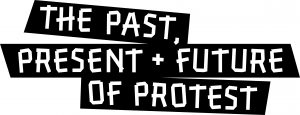
A mixed media and interdisciplinary showcase from Manchester School of Art MA students ‘interfering with the societal norms of modern day culture’.
As a collective, the students are individually responding to the theme of protest, highlighting the issues experienced in the everyday.

Suitable for 16+

Part of PHM’s year long programme exploring the past, present and future of protest, marking 200 years since the Peterloo Massacre; a major event in Manchester’s history, and a defining moment for Britain’s democracy.
Kieran Gowan Clarke
MA Fashion Art Direction
Looking into the area of protest is something that I regularly do within my own practice, but very rarely within a professional environment. The main goal for this pop up exhibition is to explore the social political boundaries that people with tattoos face on a daily basis whilst out and about in society. Alongside four other students within the postgraduate network at the Manchester School of Art, the main aim is to explore the themes of protest in our own individual ways and look at how we could possibly influence others to make minor changes within their lives and attitudes to make the world a more understanding and healthy place. The idea of looking into tattoos and their social meanings to others really came around when I was walking down the street and noticed an older woman examining my chest and hand tattoos and actively crossing the road. I really want to explore why certain people and businesses have this standoffish approach whenever they see a person who has a few tattoos. Although it may not seem like a huge deal to anyone without tattoos, this could be seen as a form of discrimination and could generally affect the person. My main goal is to allow people to see that even though someone may be covered in tattoos, this does not change the person’s actual persona and that underneath, they could have possibly been through exactly the same things in life as the viewer.
Abbie Jones
MA Textile Practice
As a textile artist my aim is to protest against this consuming digital world we live in from a conceptual stance. We have lost our sense of tactility, natural tactility, not the touch from touchscreens, a strong overbearing accomplice in our daily lives. We live in a fast paced world, we do not stop and look around; we do not see or feel to the extent we did before this progressive digital age. I want to unite people back the simplicities in life through the medium of textiles, a medium which has a powerful capability.
Michael Leyland
MA Illustration
Inspired by my time working behind bars and being a part of, or overhearing political conversations, my part of the exhibition will be a zine under the working title of We Need to Talk. I believe that there is a wide separation between political opinions, and this polarisation has many people either refusing to listen to other viewpoints or being unquestioning of their own. I want the zine to act as a conversational catalyst that will encourage more discussion about politics in an unaggressive way, detailing an unbiased history of political parties and contemporary issues that should be questioned and discussed more (e.g. the EU referendum being based on what ifs and not facts, and the White House doctoring footage and publishing it as the truth), alongside examples of people who are challenging these issues. The zine will be fully illustrated in a range of styles inspired by political cartoons and protest art. Alongside the zine, original art or enlarged prints will be presented, conveying their own messages outside the context of the zine. As an extension of the exhibition I want to take feedback in order to edit or reprint the zine and leave it in bars, coffee shops, etc in order to reach a larger and more politically varied audience than that of the People’s History Museum.
Philippa Martin
MA Photography
The end intention for my project is to create a successful pop up exhibition displaying work that collectively brings awareness to the community, of the impact we have on climate change. With particular emphasis on the amount of waste we produce in and around Manchester. Working alongside four other masters students, we have decided to organise this exhibition together, but individually work on different aspects of protest we are enthusiastic about. People’s History Museum works with the themes of protest, future, collaboration and collective action. I wanted to incorporate these themes into my project by curating a small group of four artists displaying their passion against climate change and the drastic effects we have on the environment. Displaying this through various mediums including; illustration, fashion, graphic design and photography.
I have been in contact with Mr Greg Allison, a teacher at Cringle Brook Primary School in Levenshulme, south Manchester; he teaches a Year 5 class (aged 8-9) that are excited to work collaboratively to create a body of work out of plastic. This is to represent the amount of plastic waste that ends up in the ocean every year. Mr Allison has invited me to visit the school to discuss the global issue and see their projects development and progress. I think it is extremely important to involve the future generation along with the public as I think this will benefit both the children and Manchester’s community.
Josephine O’Sullivan
MA Graphic Design & Art Direction
Through my work, I want to highlight the importance that by simply starting with yourself and making small scale changes to your lifestyle, we can make a difference globally. Using diet is a prime example, especially in the face of future affairs concerning the climate crisis. My zine will provide plant based recipes and information with the aim for it to be an interactive element to my practice, something that rather than just reading, the audience are able to practically implement a protest on a plate into their daily lives.